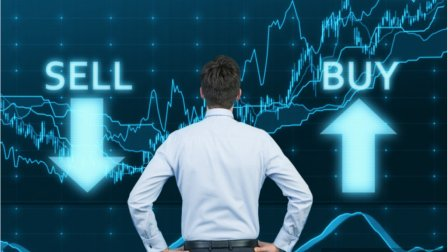The Trump Wildcard: Unlikely Gains in Ukrainian Sovereign Bonds
Meta Description: Unexpected surge in Ukrainian sovereign bonds; Trump's potential impact on the Russo-Ukrainian war; geopolitical analysis and market predictions. Explore the intricate interplay of global politics and finance.
The recent, unexpected surge in Ukrainian sovereign bonds, defying all odds and climbing a remarkable 12% in just a month, has sent shockwaves through the financial world. This isn't your typical market fluctuation; it's a high-stakes gamble fueled by a potent cocktail of geopolitical uncertainty, market speculation, and the looming shadow of a potential Trump presidency. Forget the usual suspects; this isn't about quarterly earnings reports or interest rate hikes. This is about war, peace, and the unpredictable whims of international diplomacy. The market's betting on a long shot – that a second Trump administration might just be the unexpected key to unlocking a swift resolution to the devastating Russo-Ukrainian conflict. Imagine: a scenario where the former president, known for his unconventional approach to global affairs, becomes the unlikely peacemaker, bringing an end to a war that's gripped the world for over a year. Is this pure speculation, a reckless bet on a highly volatile situation, or a shrewd investment based on a calculated assessment of the political landscape? Let's dive deep into this fascinating, and frankly, bewildering, situation. This isn't just about numbers on a spreadsheet; it's about the lives affected by this conflict, the economic ripples felt globally, and the unpredictable nature of power dynamics in the 21st century. Buckle up, because this is going to be a wild ride. We’ll unpack the intricate details, analyzing the market trends, dissecting the political pronouncements, and exploring the potential implications of this seemingly improbable scenario. We'll even address some burning questions, providing you with clear, concise answers backed by credible sources. This is more than just an investment analysis; it's a geopolitical thriller unfolding before our eyes!
The Trump Factor: A Market's Unexpected Hope
The elephant in the room, the driving force behind this unexpected market rally, is the potential return of Donald Trump to the White House. Market sentiment, it seems, is placing a significant bet on Mr. Trump's ability to broker a rapid end to the Russo-Ukrainian war. This isn't necessarily about his diplomatic expertise (though some might argue otherwise!), but about his willingness to challenge established norms and pursue unconventional solutions. His past pronouncements – claiming a 24-hour resolution is within reach – have fuelled this speculation, even if met with skepticism from some quarters. The Kremlin's response, while cautious, hints at a willingness to engage with a Trump administration on the matter. This openness, however slight, is enough to ignite the flames of market speculation.
However, this isn't a slam-dunk investment. Many seasoned investors remain deeply cautious, citing unresolved issues and the inherent risks in such a volatile geopolitical environment. Even if Trump is successful in getting negotiations started, the path to lasting peace is likely to be long and arduous. This isn't a tweet-away solution; it requires protracted discussions, compromises, and a willingness to navigate complex and often conflicting interests. The market’s optimism might be significantly ahead of the curve.
Remember, this isn't just about the potential for peace; it's also about the potential economic fallout from a prolonged war. A swift resolution could boost investor confidence in Ukraine's ability to service its debt, leading to a surge in bond prices. Conversely, a continued conflict could lead to further economic instability, potentially making these bonds far riskier investments.
Expert Opinions and Market Analyses
The market's response has been a fascinating case study in how political events can dramatically influence financial markets. Investment managers like Thys Louw from Ninety One, holding a portfolio of Ukrainian bonds, are explicitly linking the surge to the possibility of a Trump-mediated peace deal. But opinions vary. Mohamed El-Erian, a prominent economist, has cautioned against overconfidence, highlighting the uncertainties associated with a Trump administration's approach and the myriad unresolved issues that would need to be addressed in any peace agreement. Remember, the market is forward-looking, discounting future events into present prices. This bullish sentiment is a reflection of a bet on a future less plagued by war.
It's also crucial to consider the involvement of major players like BlackRock, a significant holder of Ukrainian debt who are members of the committee overseeing the debt restructuring. Their silence on the matter only adds to the enigma. Are they quietly confident or simply watchful of the unfolding drama?
Ukraine and Russia: A Look at Recent Statements
The recent statements from both Ukraine and Russia add another layer of complexity to this already intricate situation. Zelensky's call for a diplomatic resolution by next year, while acknowledging the difficulties in eastern Ukraine, reflects a pragmatic approach. However, his emphasis on the need for strong international support and a robust Ukrainian position before any meaningful negotiations can occur shows the fragility and complexity of the situation. His comments on a possible Russian offensive only emphasizes the urgency.
On the Russian side, the statements from Zakharova, emphasizing the cessation of Western military aid as a precondition for peace talks, represent a hardening of the Russian position. This points to the significant challenges in bridging the gap between conflicting narratives and achieving a mutually acceptable agreement. The reported Russian advances in Kharkiv further complicate matters, raising questions about the prospects for a near-term ceasefire.
The contrasting perspectives highlight the deep chasm separating the two sides, emphasizing the hurdles to a rapid resolution, despite the market's apparent optimism. This underscores the risk inherent in the current market sentiment, and highlights the need for a careful, nuanced examination of the situation before jumping to conclusions.
Analyzing the Geopolitical Landscape
The geopolitical landscape is a complex web of interconnected factors, making any prediction about the future of the conflict highly speculative. Even if Trump were to become president and prioritize a negotiated settlement, achieving lasting peace would depend on numerous factors beyond his control. The willingness of both sides to compromise, the role of NATO, and the shifting alliances within the international community all play a significant role. The ongoing war in Ukraine is not a simple binary equation of peace or war; it is a fluid, multifaceted situation that evolves with every passing day.
Key Players and Their Interests
Several key players hold substantial influence over the situation:
| Player | Potential Interests | Influence on Outcome |
|----------------------|-------------------------------------------------------|-------------------------------------------|
| Russia | Territorial gains, security concerns, weakened NATO | High, through military action and diplomacy |
| Ukraine | Territorial integrity, sovereignty, Western support | Moderate, dependent on external support |
| United States | Stability in Europe, containing Russian aggression | Extremely high, through military aid and diplomacy |
| European Union | Stability in Europe, managing refugee flows | High, through economic and political pressure |
| NATO | Collective security, containing Russian expansionism | High, through military deterrence and support |
These competing interests and the diverse range of possible outcomes make it difficult to predict the future with certainty.
Frequently Asked Questions (FAQs)
Q1: Is this bond surge a reliable indicator of a near-term peace deal in Ukraine?
A1: No, it's not a guarantee. While market speculation often anticipates future events, it's crucial to remember that the market is driven by many complex factors, not just the possibility of peace. The surge reflects a potential outcome, not a certainty.
Q2: How credible is Trump's claim of a 24-hour resolution?
A2: Highly unlikely. While Trump's unconventional approach might facilitate dialogue, resolving a conflict of this magnitude requires extensive negotiations and compromise. Twenty-four hours is far too short a timeframe to resolve such complex issues.
Q3: What are the risks associated with investing in Ukrainian sovereign bonds right now?
A3: The risks are significant. The ongoing conflict, the uncertainty surrounding a potential Trump presidency, and the inherent volatility of emerging market bonds all contribute to a high-risk investment. This isn’t for the faint of heart.
Q4: What role does BlackRock play in this situation?
A4: As a major bondholder and member of the debt restructuring committee, BlackRock's actions and future decisions will have a significant impact on the success and ultimate outcome of Ukrainian debt servicing. Their silence reflects the inherent risk and uncertainty of the situation.
Q5: Could the potential for a Trump presidency negatively impact the situation in Ukraine?
A5: Yes, it's a possibility. While a Trump administration might aim for a swift resolution, the approach taken could potentially undermine Ukraine's interests or inadvertently embolden Russia. The outcome is far from predictable.
Q6: What should investors do in light of this situation?
A6: Proceed with extreme caution. This is a high-risk, high-reward scenario. Thorough due diligence, a comprehensive understanding of the geopolitical risks, and a well-diversified portfolio are essential.
Conclusion
The recent surge in Ukrainian sovereign bonds represents a fascinating intersection of global politics and finance. The market's response to the potential return of Donald Trump highlights the significant impact political events can have on investment decisions. However, investors should approach this situation with caution, recognizing the inherent risks and the uncertainty surrounding the future of the Russo-Ukrainian conflict. There is no crystal ball. While the possibility of a Trump-brokered peace deal remains a key factor driving market sentiment, it's crucial to view this situation from a multifaceted perspective, acknowledging the diverse interests of key players, the challenges in achieving a lasting peace, and the potential for unforeseen developments. This is a high-stakes gamble, and only time will tell if the market's optimism will be vindicated.



